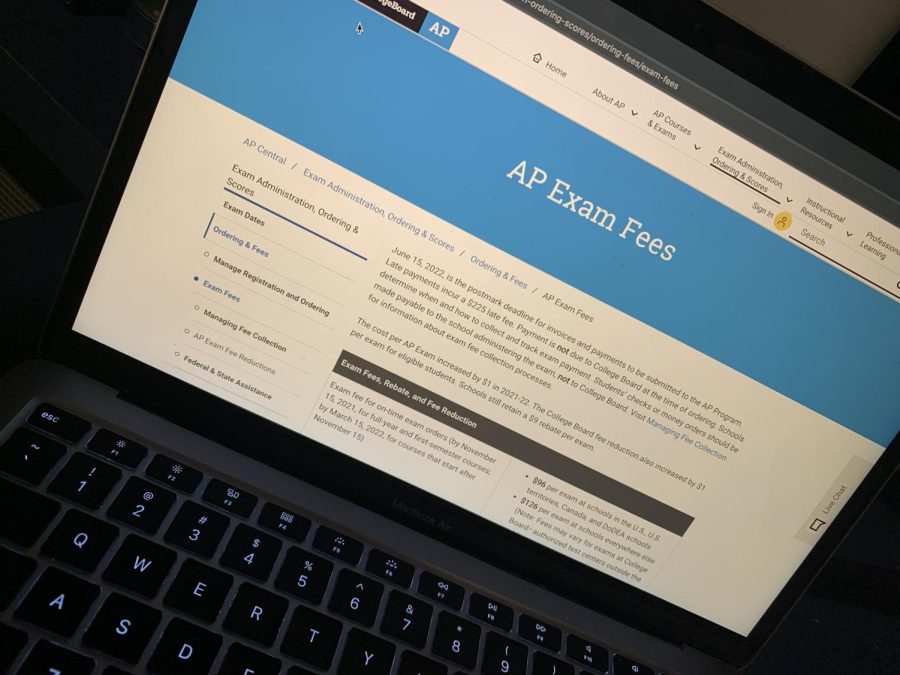The College Board Favors Profit Over the Success of Students
January 5, 2022
Every year, students spend large amounts of time and money on tests that are supposed to accurately reflect their knowledge and effort. Unfortunately, the College Board, the non-profit organization that administers SAT, PSAT, and AP testing, seems to care more about their profit than providing an opportunity for students to showcase their academic excellence.
According to their 990 tax exemption form, the College Board brought in over $1.1 billion in revenue in 2018. Just by looking at the six-figure salaries of CEO David Coleman and President Jeremy Singer, you would never guess that College Board was a non-profit organization.
Additionally, the College Boards finances are notoriously hard to make sense of. Company investments in hedge funds are constantly appreciating and multiple overseas accounts store an unknown sum of money. Because their economics are so cryptic, it is difficult for anyone to challenge the College Board’s authority. “The College Board is extremely good at circling the wagons and protecting itself,” said Robert Schaeffer of FairTest, in an interview with Forbes Magazine. FairTest is an organization dedicated to dealing with fairness issues in student-taken tests.
As executives at the College Board fly first class per their 990 form, their neglect of many students is causing scores to crash. For underprivileged students, the rushed and poorly planned online testing during the pandemic left them at a severe disadvantage. According to the United States Census Bureau’s Household Pulse Survey conducted in 2020 and 2021, 4.4 million households with students don’t have consistent access to a computer and 3.7 million have no internet access.
For students like these, taking an online exam would require being able to go somewhere with free internet access such as a Starbucks or McDonalds. Taking a timed test in a busy environment like this is extremely harmful to productivity. In a study published in the U.S. National Library of Medicine, it was concluded that mental workload and attention were significantly reduced as a result of noise exposure in a work environment. Students who were forced to take their 2020 and 2021 AP exams needed to have internet access in a quiet environment or their scores would suffer.
Economic status doesn’t only affect AP testing. In an interview with PBS, Robert Schaeffer emphasized the strategy involved with taking the SAT and the benefit of having access to a tutoring course. Schaeffer added that because it is impossible for admissions offices to know if they are reviewing the test of a student who has been tutored or one who has not, the class disadvantages can be felt in college admissions as well.
2021 AP Exams also gave students who took the test on paper an unfair advantage. Although given the same time limit, in-person test takers had the freedom to review their test upon completing each section, whereas those who took the test online were unable to come back later to any of the questions. Once a multiple choice question was submitted, there was no ability to revisit that question again. This directly counters one of the most basic and common test strategies; if you don’t know the answer to a question, skip it, and then revisit it later. If a student were to have their memory refreshed by one of the later test questions, they were only able to finish what they had left blank if they were taking the test on paper.
Personally, it was extremely frustrating to me to remember the answer to a difficult question and not be able to go back and change my answer. This was supposed to be an anti-cheating precaution, however a timed test already takes away the ability for students to scour their notes for answers or punch a question into Google on their phone. It was especially frustrating knowing being granted this advantage was something that I had no say in. Taking AP exams on paper was an option that was only available to some schools and was entirely dependent on state and regional COVID-19 restrictions. A school with stricter guidelines would be forced to take their exams online, whereas a school with fewer restrictions would have been able to take the test in-person and on paper.
Examples of mismanagement and poor planning by the College Board are plentiful, and so are negative opinions about them at San Rafael High. Asking around only prompted passionate rants about grievances that students may have had with the College Board as a whole, their scheduling, their customer support, and more. “I couldn’t log into my account or reset my password for months,” said senior Max Shilstone. “I tried to contact customer service to help, but they didn’t answer. It took forever to get it to work and the whole process was super inconvenient and frustrating.” There is an obvious disconnect between students at San Rafael High and a group which monopolizes the testing industry and is supposed to be serving the students.
One might assume that students only feel frustrated with the College Board because they performed poorly on their exams, however even students who consistently received 4’s and 5’s were also opposed to the group. One student, who preferred to remain anonymous, received a 4 and a 5 last year on their two AP exams and scored in the 97th percentile on their SAT. This student told me that AP exams promote a style of writing that is only based on satisfying the rubric and does not reflect any writing skills that a student may have.
We need to end the College Board’s monopoly on testing because it does not give students an equal opportunity to succeed. The College Board is driven by the revenue that they bring in from tests and not the mission of helping students find an accurate way to display their educational excellence. At the very least, the College Board needs to make their finances accessible to the public and redirect funds into increasing student accommodations. Education is an opportunity, and currently the College Board is taking away this opportunity more than it is providing it for the students who need it most.







































Alex Clark • Jan 14, 2022 at 12:17 pm
Great Article! Amazing fact based reporting.